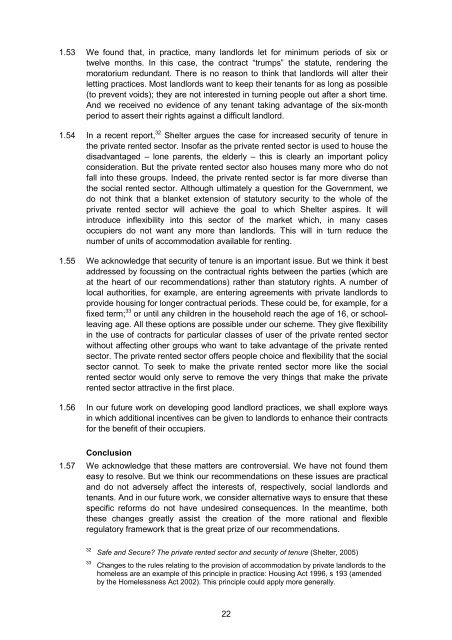Renting Homes: The Final Report - Law Commission
Renting Homes: The Final Report - Law Commission
Renting Homes: The Final Report - Law Commission
You also want an ePaper? Increase the reach of your titles
YUMPU automatically turns print PDFs into web optimized ePapers that Google loves.
1.53 We found that, in practice, many landlords let for minimum periods of six or<br />
twelve months. In this case, the contract “trumps” the statute, rendering the<br />
moratorium redundant. <strong>The</strong>re is no reason to think that landlords will alter their<br />
letting practices. Most landlords want to keep their tenants for as long as possible<br />
(to prevent voids); they are not interested in turning people out after a short time.<br />
And we received no evidence of any tenant taking advantage of the six-month<br />
period to assert their rights against a difficult landlord.<br />
1.54 In a recent report, 32 Shelter argues the case for increased security of tenure in<br />
the private rented sector. Insofar as the private rented sector is used to house the<br />
disadvantaged – lone parents, the elderly – this is clearly an important policy<br />
consideration. But the private rented sector also houses many more who do not<br />
fall into these groups. Indeed, the private rented sector is far more diverse than<br />
the social rented sector. Although ultimately a question for the Government, we<br />
do not think that a blanket extension of statutory security to the whole of the<br />
private rented sector will achieve the goal to which Shelter aspires. It will<br />
introduce inflexibility into this sector of the market which, in many cases<br />
occupiers do not want any more than landlords. This will in turn reduce the<br />
number of units of accommodation available for renting.<br />
1.55 We acknowledge that security of tenure is an important issue. But we think it best<br />
addressed by focussing on the contractual rights between the parties (which are<br />
at the heart of our recommendations) rather than statutory rights. A number of<br />
local authorities, for example, are entering agreements with private landlords to<br />
provide housing for longer contractual periods. <strong>The</strong>se could be, for example, for a<br />
fixed term; 33 or until any children in the household reach the age of 16, or schoolleaving<br />
age. All these options are possible under our scheme. <strong>The</strong>y give flexibility<br />
in the use of contracts for particular classes of user of the private rented sector<br />
without affecting other groups who want to take advantage of the private rented<br />
sector. <strong>The</strong> private rented sector offers people choice and flexibility that the social<br />
sector cannot. To seek to make the private rented sector more like the social<br />
rented sector would only serve to remove the very things that make the private<br />
rented sector attractive in the first place.<br />
1.56 In our future work on developing good landlord practices, we shall explore ways<br />
in which additional incentives can be given to landlords to enhance their contracts<br />
for the benefit of their occupiers.<br />
Conclusion<br />
1.57 We acknowledge that these matters are controversial. We have not found them<br />
easy to resolve. But we think our recommendations on these issues are practical<br />
and do not adversely affect the interests of, respectively, social landlords and<br />
tenants. And in our future work, we consider alternative ways to ensure that these<br />
specific reforms do not have undesired consequences. In the meantime, both<br />
these changes greatly assist the creation of the more rational and flexible<br />
regulatory framework that is the great prize of our recommendations.<br />
32 Safe and Secure? <strong>The</strong> private rented sector and security of tenure (Shelter, 2005)<br />
33 Changes to the rules relating to the provision of accommodation by private landlords to the<br />
homeless are an example of this principle in practice: Housing Act 1996, s 193 (amended<br />
by the Homelessness Act 2002). This principle could apply more generally.<br />
22

















